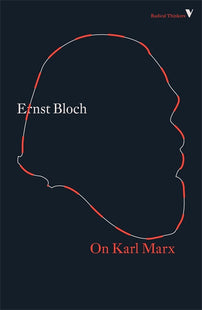Hate or Anger?
A 1967 conversation with Ernst Bloch on the difference between hatred and anger.

This fragment from a 1967 conversation with Ernst Bloch is collected in in Tendenz-Latenz-Utopie (Suhrkamp, 1978). Translated by Adrian Wilding. A new Radical Thinkers edition of Bloch's On Karl Marx is out now.
Question: Hate is a phenomenon, a fact, with which we are confronted — directly or indirectly — every day. Above all, I am thinking of that collective hate which one can exploit politically, manipulate. In our conversation I am particularly interested in how you judge racial hatred and class hatred. The motifs are different. But isn’t the result – when considered – the same: the destruction of people?
Bloch: In the first place, hate is not a pretty quality. It makes one angry and blind. It distorts the face, even when it is right. But between class hatred and racial hatred there are nevertheless very clear differences in content and in addressee. Whereas in the stifled types of hate, such as racial hatred and xenophobia, an excess of aggression is vented, one that never questions its own grounds, class hatred has — since the time of Spartacus — a ground in exploitation and oppression.
Between the sayings "the Jews are our misfortune" or "foreign workers are our misfortune” and the investigations in Marx’s Capital into the really humanly hostile character of capitalism, one must make a very clear distinction. In the 18th Century, from the time of Adam Smith, and already before that, in the 15th and 16th centuries, as the entrepreneur freed himself from the guilds, a great unleashing of productive forces took place; there was the French Revolution, the Enlightenment, the Encyclopédie. All of this, even the category of freedom, only came about through an unshackling of the economic system. In this sense, Marxism judges capitalist development up until about 1800 as quite progressive. (That is something which always puzzled conservatives and reactionaries). However, capitalism remained progressive only until the contradictions grew so great that the citoyen climbed into the old feudal bed.
Hatred from below, when it appears, is induced from on high. And those who are hated have played a major part in this because they themselves have hated: hated the little man, the serf, the oppressed — especially when they revolted — just as the White Terror matched — if not exceeded — the Red Terror, an excess that can only be likened to the poor wood thief’s inordinate punishment on the gallows.
Race hate and xenophobia derive from the dullness of the conservative, his lack of logical insight into the facts, which leads him to cheer and join in with the hatred from the right or the hatred from above, which then expresses itself in smears and stupidity and concludes in a general anti-communism. This anti-communism, like anti-Semitism, which also comes mostly from the right and which always seeks to generalize — “the Russian”, “the German”, “the Frenchman”, “the Jew” — this anti-communism is one of the worst forms of generalization, lacking all regard for differences. Generalization thrives where stupidity reigns.
But the main issue seems to me to be the question: is hatred in concrete revolutionary situations a means that might, at least for a time, be allowed? That hatred which quickly transforms itself when authorized (that is, from on high) so that what is corrupt and what is criminal (themselves provoked by blindness and by pure resentment) disappear — this hate must be transformed into anger. Anger looks very different from hatred. Thus one speaks of righteous anger but not of righteous hatred. Anger is that element which lead to the storming and destruction of the Bastille, the conquest of the Fortress of Zwing-Uri and William Tell’s refusal to bow before Gessler’s hat. Anger is indignation over assaults upon human dignity, our upright gait. Hate is pale, depressed, cowardly, smoldering, it has beer fumes in it (which can become highly explosive). Anger is open, it makes one not pale but red. Where the miserable petty-bourgeois Nazi is cagey in his hate, anger throws caution to the wind. Anger is not opportunistic; it can suddenly go against its own interest. For this reason it has an affinity with higher things.
So you view class hatred more as anger than as hate?
Every revolution is accompanied by anger. Anger does not necessarily make one blind. It is also active and temporary. Hatred, by contrast, continues to fester. When anger breaks out, one still has time to reflect — sine ira cum studio — otherwise one would be tainted by that so easily corruptible hate. Hate is a corrupt affect when it does not transform into the clarity of anger. Hatred loses its clear head and for that reason does not belong in the class struggle. It never finds its correct addressee.
[book-strip index="1" style="buy"]